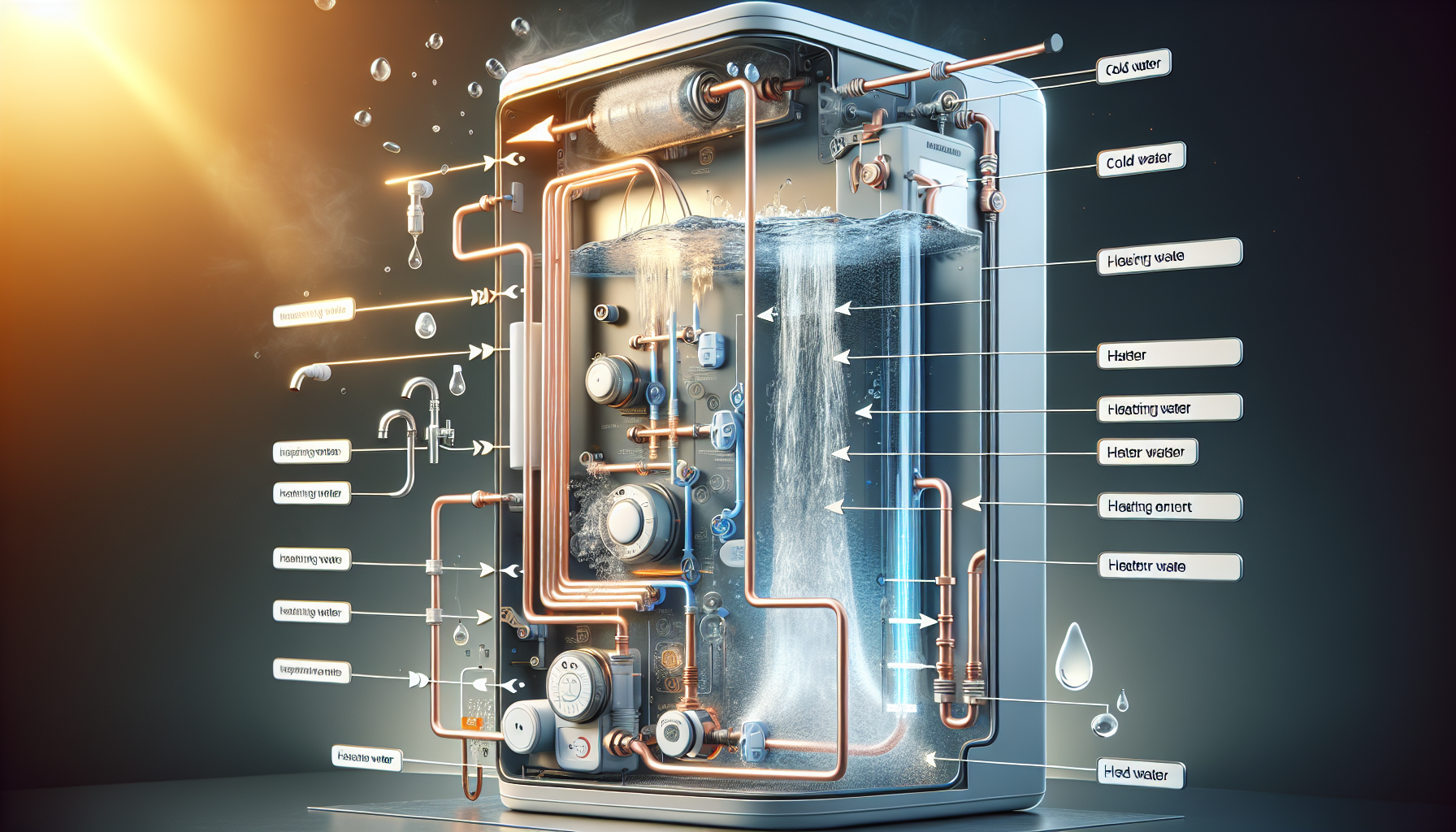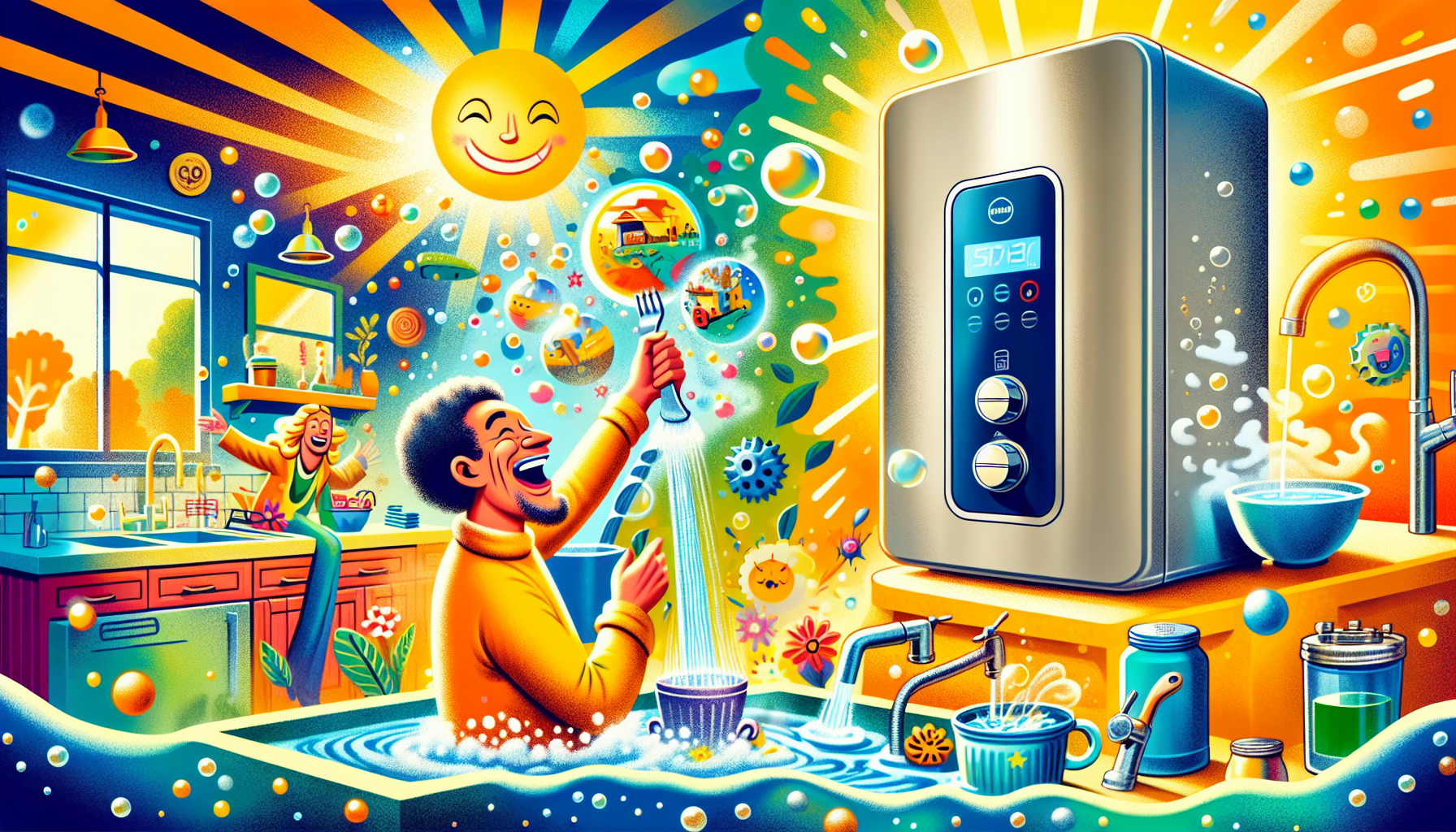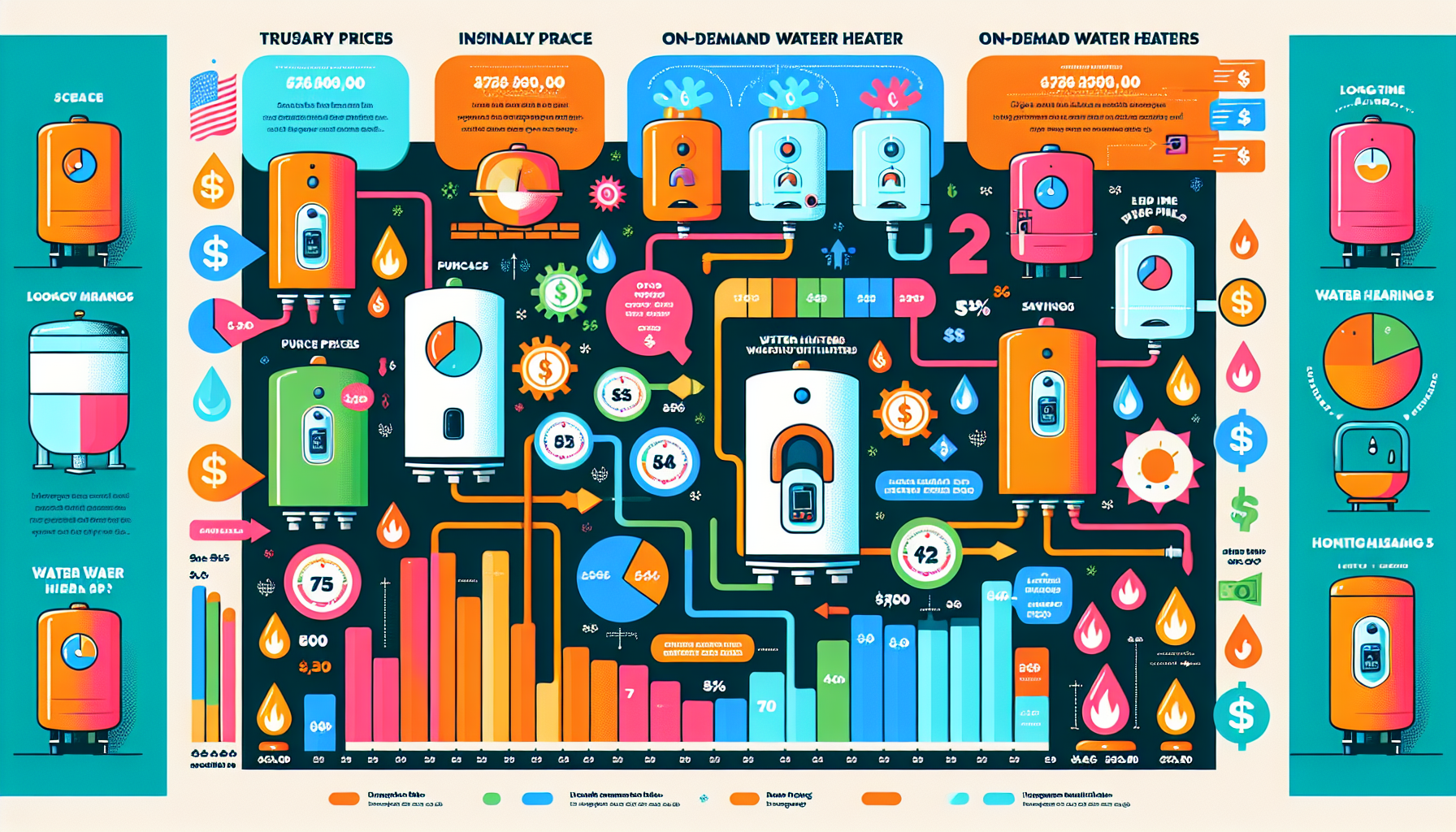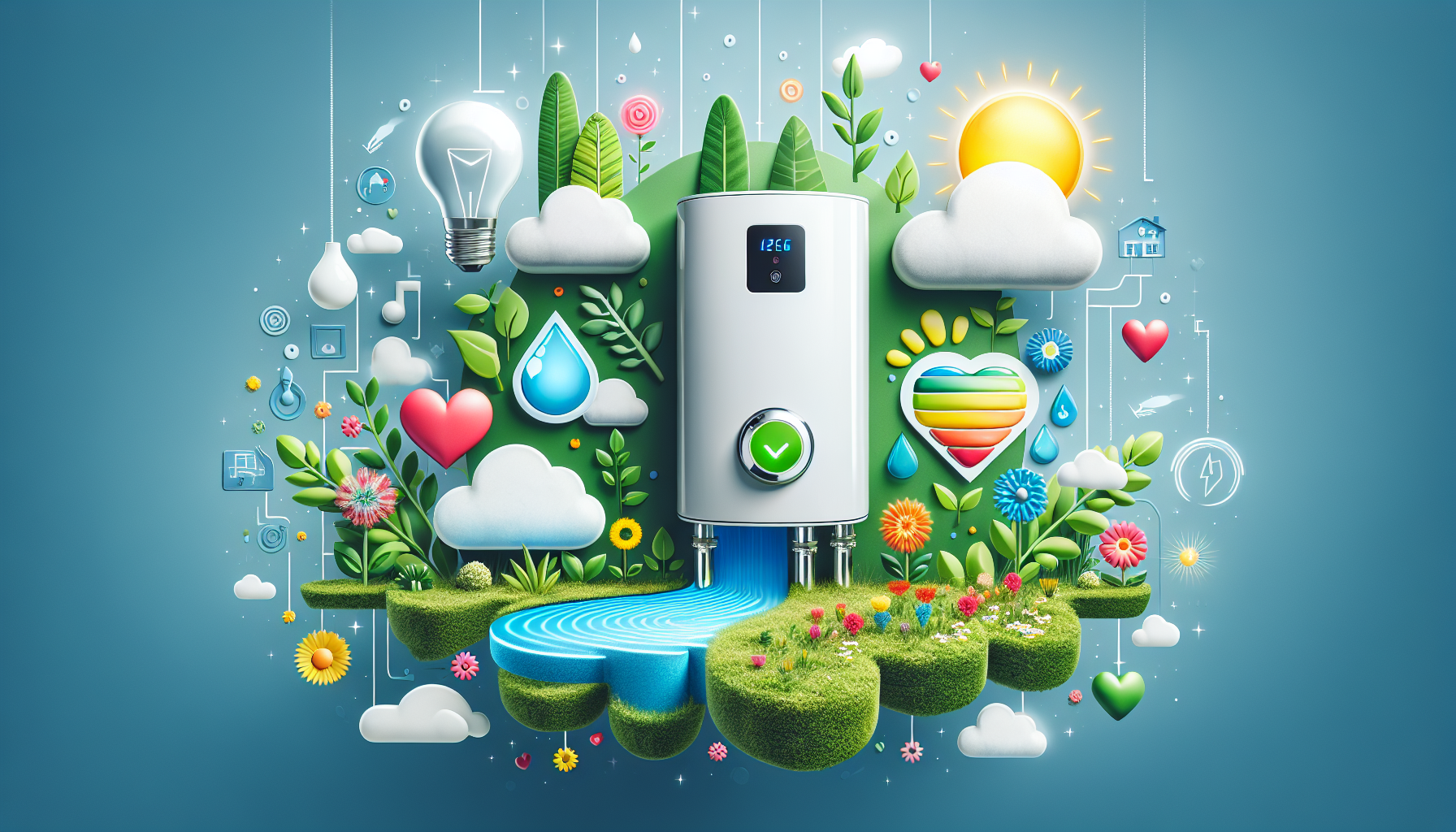Hot Water Solutions: Choosing the Best Water Heater on Demand
Ever wondered if you could have hot water available instantly without the hassles of a storage tank? That’s what a water heater on demand offers. This guide will explain how tankless water heaters work, their key benefits, and what you need to know to choose the best one for your home.
Key Takeaways
-
Tankless water heaters provide an energy-efficient and space-saving hot water solution, heating water on demand without the standby losses associated with traditional models.
-
The choice between electric and gas tankless water heaters should be based on household hot water needs, installation requirements, and accessibility to power sources.
-
Proper installation, regular maintenance, and understanding the cost-benefit ratio are crucial for maximizing the performance and lifespan of tankless water heaters.
Hot Water Solutions: Choosing the Best Water Heater on Demand

When it comes to hot water solutions, tankless water heaters stand out for their efficiency and convenience. Unlike conventional water heaters that keep a tank full of hot water, tankless systems heat water only when needed, eliminating energy loss and offering a continuous flow of hot water. These compact, wall-mounted units are designed to meet your household’s peak hot water usage, ensuring a reliable supply without the need for a bulky storage tank.
The choice of a tankless water heater depends on several factors, including the size of your household and the type of fuel available. Gas-powered models typically offer higher flow rates, making them ideal for larger families, while electric models are easier to install and maintain.
Understanding your specific needs and the capabilities of different tankless systems allows you to select a hot water solution that delivers both comfort and efficiency.
Introduction
In the average Australian household, heating water accounts for about 30% of the energy budget, making it a significant expense. Australian Hot Water offers a range of services, including the supply, installation, and maintenance of hot water systems, ensuring that your home has a reliable and efficient hot water supply.
Choosing the right system not only saves money but also reduces your environmental impact.
Understanding On-Demand Water Heaters

Tankless water heaters are often referred to as instantaneous water heaters. They offer hot water as needed, eliminating the requirement for a storage tank. When a hot water faucet is turned on, cold water flows through a heat exchanger, where it is heated instantly. This process ensures that you have hot water whenever you need it, without the standby energy losses associated with traditional water heaters.
The benefits of tankless water heaters extend beyond just hot water on demand. They offer significant environmental advantages due to their energy efficiency and reduced operational costs. Eliminating the need for a constantly heated tank, these systems lower utility bills and decrease your carbon footprint, making them an eco-friendly choice for modern homes.
Types of On-Demand Water Heaters
There are two main types of on-demand water heaters: electric and gas. Both types have their unique advantages and are suitable for different household needs.
Electric tankless water heaters are known for their ease of installation and precise temperature control, while gas models typically offer higher flow rates, making them ideal for larger households.
Electric On-Demand Water Heaters
Electric tankless water heaters use heating elements activated by water flow to deliver hot water on demand. These models are compact, energy-efficient, and offer precise temperature control, making them an excellent choice for homes with adequate electrical infrastructure. However, they can consume between 20 and 60 kW of power per hour, which may necessitate upgrades to your home’s electrical system.
Despite their high operating costs, electric tankless water heaters are an attractive option for those looking to reduce energy consumption and enjoy endless hot water. Their ease of installation and maintenance, coupled with their compact design, make them a popular choice in regions where electricity is more cost-effective than gas.
Gas On-Demand Water Heaters
Gas tankless water heaters are known for their ability to produce higher flow rates compared to electric models, making them ideal for households with high hot water demands. These units can be installed either indoors or outdoors, providing flexibility based on your space and configuration. Powered by natural gas, these heaters require proper ventilation to ensure safety and efficiency, preventing gas leaks and corrosion.
One of the main advantages of gas tankless water heaters is their efficiency in delivering hot water almost instantaneously. However, the need for larger gas lines and proper ventilation systems can increase the complexity and cost of installation. Despite these challenges, the higher performance and potential energy savings make gas models a compelling option for larger homes or those with multiple hot water outlets.
Key Benefits of On-Demand Water Heaters

On-demand water heaters offer several key benefits, including energy efficiency, space-saving design, and an endless supply of hot water. These advantages make them an attractive alternative to traditional water heaters, especially for households looking to reduce energy consumption and enjoy reliable hot water on demand.
Understanding these benefits helps you appreciate why a tankless water heater might be the right choice for your home.
Energy Efficiency
One of the standout benefits of tankless water heaters is their energy efficiency. Unlike traditional water heaters that keep a tank full of hot water, tankless units heat water only when needed, avoiding standby heat losses and significantly reducing energy consumption. Homes using less than 41 gallons of hot water daily can find tankless models 24%–34% more energy efficient than conventional systems, leading to substantial savings on utility bills.
The environmental benefits of tankless water heaters are also noteworthy. By reducing overall energy consumption, these units help lower greenhouse gas emissions, contributing to a smaller carbon footprint. Whether you opt for an electric or gas model, investing in a tankless system can lead to significant cost savings and a more eco-friendly lifestyle.
Space-Saving Design
The compact design of tankless water heaters is another significant advantage. These units are typically wall-mounted, freeing up valuable floor space in your home. Their small footprint makes them ideal for indoor installations, ensuring easy access for maintenance while optimizing space efficiency.
This space-saving design is particularly beneficial for homes with limited storage areas, allowing you to make better use of your living space.
Endless Hot Water Supply
One of the most compelling features of tankless water heaters is their ability to provide an endless supply of hot water. Unlike traditional systems that rely on a storage tank, tankless units heat water instantly as it flows through the system, ensuring a constant supply whenever you need it. This means no more waiting for the tank to refill and reheat, making it perfect for large families or households with high hot water demands.
Whether you’re taking a long shower or running multiple appliances simultaneously, a tankless water heater ensures that you won’t run out of continuous flow hot water. This continuous flow of hot water enhances comfort and convenience, making daily tasks more efficient and enjoyable.
Choosing the right continuous flow systems for your needs allows you to enjoy the benefits of endless hot water without the limitations of a traditional storage tank.
Installation Considerations for On-Demand Water Heaters
Installing a tankless water heater requires careful planning and consideration, including tankless water heater installation. Factors like electrical requirements, ventilation needs for gas models, and the choice between professional installation and DIY play crucial roles in ensuring the safe and efficient operation of your new system.
Understanding these considerations helps you make informed decisions and avoid potential pitfalls during the installation process.
Electrical Requirements
Electric tankless water heaters typically require a 240-volt supply to operate effectively. Even gas-powered models need a 120-volt electric power source for their control systems. Ensuring that your home’s electrical infrastructure can support these requirements is essential for the safe and efficient operation of your tankless water heater.
Ventilation Needs for Gas Models
Proper ventilation is critical for gas tankless water heaters to prevent gas leaks and ensure efficient operation. These units must be vented with Category III stainless steel materials to avoid corrosion and ensure safety.
Whether installed indoors or outdoors, adequate ventilation is a must to maintain the performance and safety of your gas tankless water heater.
Professional Installation vs. DIY
Due to the complexity and specific requirements of tankless water heaters, professional installation is often recommended. Qualified technicians can identify potential issues and ensure that the installation meets all safety standards.
While DIY installation might seem cost-effective, it can lead to problems that could have been avoided with professional expertise.
Maintenance Tips for On-Demand Water Heaters
Proper maintenance is key to extending the lifespan and efficiency of your tankless water heater. Regular flushing, annual professional servicing, and monitoring water quality are essential practices to keep your system running smoothly.
Following these maintenance tips ensures that your tankless water heater provides reliable hot water for years to come.
Regular Flushing
Regular flushing of your tankless water heater helps remove mineral deposits that can build up over time, affecting performance. Fans and filters should also be checked frequently to ensure the system is functioning efficiently.
Maintaining these components prevents issues and keeps your system running at its best.
Annual Professional Servicing
Annual professional servicing is crucial for the long-term performance of your tankless water heater. With proper maintenance, these units can last over 20 years, significantly outlasting traditional tank-style systems.
Professionals can ensure that critical components like fans and filtration systems are in good working order, preventing costly repairs down the line.
Monitoring Water Quality
Monitoring the quality of your water is essential to maintaining the efficiency of your tankless water heater. High mineral content can lead to scale formation, reducing efficiency and increasing energy costs. Additionally, low pH levels can cause corrosion, making it crucial to monitor and address water acidity to prevent damage to your system.
Cost Analysis of On-Demand Water Heaters

The cost of installing and maintaining a tankless water heater can be higher than traditional models, but the potential long-term savings make it a worthwhile investment. Analyzing initial purchase costs, installation expenses, and long-term savings helps you make an informed decision about whether a tankless water heater fits your budget.
Initial Purchase Costs
The initial purchase cost of tankless water heaters can range from $600 to $3,500, depending on the size and features of the unit. Electric models are generally more affordable, with prices between $800 and $1,500, while gas-powered models tend to be more expensive. Understanding these costs can help you budget for your new system.
Installation Expenses
Installation expenses for tankless water heaters can be significant. Electric models cost between $700 and $2,000 for supply and installation, while gas models can be even more expensive due to the need for larger gas lines and proper ventilation.
Labor costs are also high, making professional installation a considerable part of the overall expense.
Long-Term Savings
Despite the higher initial and installation costs, tankless water heaters can lead to significant long-term savings. These systems only operate when hot water is needed, reducing energy costs by up to 50%.
Additionally, the longer lifespan of tankless units means fewer replacements, saving homeowners over $1,000 over the system’s life.
Environmental Impact of On-Demand Water Heaters

Tankless water heaters offer several environmental benefits, especially electric models, which produce no emissions during operation. These systems guarantee clean water and reduce the risk of contamination, making them a safer choice for your home and the environment.
However, gas models can pose risks such as potential carbon monoxide leakage, which should be carefully managed.
Making the Switch: Is an On-Demand Water Heater Right for You?
Deciding whether to switch to a tankless water heater depends on several factors, including your household’s hot water needs, budget, and existing infrastructure. Households with high peak hot water demands might find a gas model more suitable, while those with adequate electrical systems may benefit from an electric unit. Evaluating these factors will help you determine if a tankless water heater is the right choice for your home.
Consider your budget and personal circumstances, such as the age of your existing hot water system and whether it can be replaced or optimized. By thoroughly assessing these aspects, you can make an informed decision that balances cost, efficiency, and convenience, ensuring that your investment in a tankless water heater meets your household’s needs.
Summary
In conclusion, tankless water heaters offer numerous benefits, including energy efficiency, space-saving design, and an endless supply of hot water. While the initial costs and installation expenses can be higher, the long-term savings and environmental benefits make them a worthwhile investment. By understanding your household’s needs and the capabilities of different tankless systems, you can choose the best solution for your home. Make the switch today and enjoy the comfort and efficiency of a tankless water heater.
Frequently Asked Questions
What are the main types of on-demand water heaters?
The main types of on-demand water heaters are electric and gas tankless water heaters, each with distinct benefits; electric units are simpler to install, while gas units provide higher flow rates. This allows you to choose based on your specific needs and preferences.
How much can I save on energy costs with a tankless water heater?
You can save up to 34% on utility bills and potentially up to 50% on water heating expenses by switching to a tankless water heater. This significant reduction can lead to substantial long-term savings.
What are the electrical requirements for installing an electric tankless water heater?
The electrical requirements for installing an electric tankless water heater include a 240-volt supply, while gas models necessitate a 120-volt power source for their control systems. Ensuring these voltage specifications are met is essential for proper operation.
How often should I perform maintenance on my tankless water heater?
It is recommended to perform regular flushing and to schedule annual professional servicing for your tankless water heater to ensure its efficiency and longevity.
Are tankless water heaters environmentally friendly?
Tankless water heaters are environmentally friendly, particularly electric models, as they produce no emissions during operation and lower energy consumption and greenhouse gas emissions. This makes them a more sustainable choice for heating water.






















